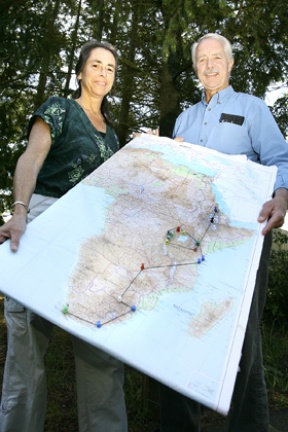Kim Bush and Judy Friesem took a message of dispute resolution.
Even before they met, Kim Bush and Judy Friesem shared a passion for Africa.
Bush spent 1963 and 1964 in Tanzania and in South Africa, where he joined the anti-apartheid movement and began a life of activism.
Friesem, meanwhile, adored Africa’s landscapes. As a child, she devoured “Born Free” and Joy Adamson’s other wildlife books. She later became enamored of the continent’s music and cultural vibrancy.
In couple-hood, the two developed a vision of integrating their mutual passion and their life’s work – he as an educator, she as a mediator – into a peace building mission to African nations hard-hit by recurring conflict.
“We’d been daring ourselves to do it,” Bush said.
So they did. On Sept. 12 of last year, Friesem and Bush landed in the urban chaos of Addis Ababa, Ethiopia, the start of what became a densely packed tour of the continent with stops in eight countries. Seven months later, they returned with stories to tell.
Today, Bush will moderate the year’s final Great Decisions discussion at the Bainbridge Public Library, focusing in particular on the state of South Africa.
There, despite the end of apartheid and the first democratic elections 13 years ago, he says enormous disparity still exists between “desperately poor” black South Africans living in townships and the “filthy rich” and still largely white elite in Cape Town.
South Africa was the last stop on their visit and by no means its primary focus.
Friesem and Bush also applied their training in in Rwanda, Burundi, the Democratic Republic of Congo, Uganda, Kenya, Ethiopia and Tanzania, always with the purpose of helping community leaders get back to the rituals and roots of conflict resolution.
Wanting to do their work under the auspices of an established peace building organization, the couple researched the options and connected with the African Great Lakes Initiative, an organization focused on conflict management and reconciliation in the combat-prone countries of the African Great Lakes Region.
Under AGLI’s umbrella, the couple spent a portion of their time conducting week-long mediation training sessions.
Working from tribal and community leaders’ real-world disputes, Friesem and Bush helped community leaders internalize underlying concepts of conflict resolution to take home and apply.
“OK, so take a week-long training in another culture and language…add in hand-written notes as computer access was rare…imagine pounding rains on a metal roof of a large concrete room… and picture 3 bare light bulbs, 2 burned out. That’ll get you started,” Friesem wrote in the couple’s online trip journal of her first mediation session in Rwanda in November.
“What I’ve learned, and how I came to see my work there,” Friesem said, “is that indigenous means of (resolving conflicts) are very similar to mediation.”
Years of war and inter-tribal conflict had created societies in which ritual had broken down, which, in turn, led to the disintigration of traditional mediation processes.
She came to see her role not as an instructor, but as a guide who could help them remember. In that respect, Friesem regards her work as “radical” in its original sense, of having roots.
Friesem and Bush said that when they arrived in each locale, community leaders expected them to lecture and appeared prepared to “give up” and adopt whatever mandate the two white Americans were there to enforce.
“That’s the legacy of colonialism, and apartheid,” Bush said.
The reality of their peace building philosophy is far different. Bush believes that in efforts like these, white outsiders’ prime directive should be “learning how to shut up.”
Friesem phrases it more mildly, describing the act of planting a seed and then getting out of the way as it grows. And specifically in her case, “training the trainers, and then getting out of the way.”
“We were in the company of amazing people who were courageous, resilient, strong, dedicated to moving forward and to healing,” Friesem said.
“They were starved – they could absorb everything I had to offer. So it was an incredible response.”
After returning to Bainbridge in April, Friesem and Bush began re-acclimating to their comfortable Bainbridge world. Yet they find themselves compelled to share what they know.
Friesem is building her freelance mediation business back up, and Bush said they’re averaging two talks per week at venues like the library, Bainbridge High School and Hyla Middle School. Bush is also working with a Bainbridge education and outreach organization, Global Source Education.
So despite a wish take it a little easy, Bush and Friesem aren’t slowing down.
“Peace isn’t a passive term,” Friesem said.


